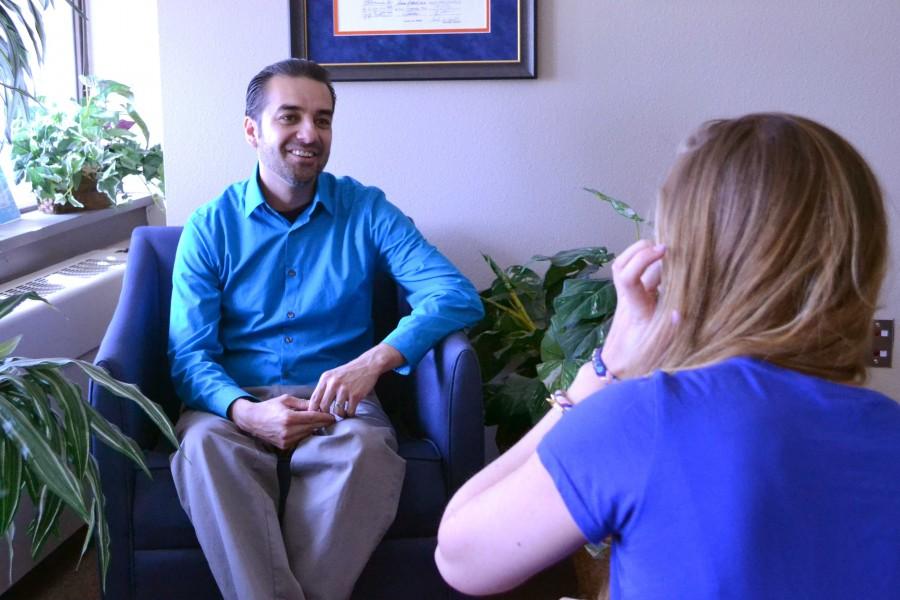Stress and depression are among the top mental health problems that affect college students.
According to the 2015 National Health Assessment, 30 percent of students said stress had directly affected their grades, while more than 13 percent said depression also had a negative impact on their grades.
“The most important thing I tell people is that your health matters more than your grades,” said Rodrigo Lugo senior biology major and president of the UTEP chapter of To Write Love in her Arms, a national organization dedicated to mental health support. “If you need to drop a few classes, or a few homework’s and maybe suffer more in class but just so you can take the time for yourself and feel better about your problems.”
Some students at UTEP said that stress comes with the fast paced lifestyle of college as well as other negative events.
“I would say the tests are a big part of stress. I study a lot and it takes a lot of time. Sometimes I just feel like giving up,” Erika Orona, junior education major said “Traffic, not being able to eat sometimes, not being able to sleep well sometimes, and family problems are all common things which causes stress among us.”
Orona said that when she is stressed or depressed she puts her homework aside and talks about her problems with others in order to relax herself.
“I just go out for a while and then come back with a better mood. When I was depressed I didn’t go to a counseling center, I talk a lot with my sister so she is the one that helps me a lot,” Orona said.
Besides affecting the academic life of a student, depression can affect a person’s physical health resulting in bigger health problems.
“Depression causes inappropriate release of adrenaline which, over time, damages the cardiovascular system. An increase in artery and blood vessel stress are further health effects of depression. This can increase the risk of blood clots and heart attack,” said psychologist and clinical counselor Jorge A. Marquez over email.
The effects of stress can become very serious and can shorten a persons life expectancy according to the National Alliance on Mental Illness.
“The effects of depression cause an overall increase in mortality, where those with depression may die 25 years sooner than the average person,” Marquez said.
Another major problem that plagues college aged students is suicide.
The National Alliance on Mental Illness reported that in 2012, suicide was the third leading cause of death in the U.S. for people between the ages of 15-24.
Orona says that students have to speak up and talk about their problems.
“A little help does not hurt anyone,” Orona said. “If you don’t talk to people and close yourself, people around you won’t know what is going on with you. That is probably why people tend do that (suicide).”
One out of 10 college students have contemplated suicide and every year more than a 1,000 college students take their own lives, according to a report by Emory University.
“It is sad to see such high numbers, but a therapist will be there to help, but it’s not like a magical pill that will make everything better in an instant,” Lugo said. “They just have to have that persistence and understand that it is process that will help you over time.”
Many college students that suffer from any mental health issues don’t seek help due to the stigmas that arise.
“Education about these disorders and how they can affect everyone will break the stigma,” Lugo said. “We need more examples in the media about people who have overcome mental health problems.”
According to NAMI, in 2012, African-Americans and Hispanic Americans used mental health services at about one half the rate of whites.
“Some might feel ashamed or afraid of seeking treatment because they might believe that it means they are crazy. However, crazy is a negative label that has is used to insult individuals who may be struggling with emotional or psychological situations,” Marquez said. “It is important that as a campus we start advocating for the importance of taking care of your emotional and physical well-being.”
UTEP student organizations like To Write Love in Her Arms and NAMI encourage students that are having a hard time to seek help. They also spread awareness about mental health and how to break the stigma that surrounds mental illness.
“Our goal is to hopefully reduce those numbers. Make people know that it is okay to seek help, that it doesn’t mean you are weak,” Lugo said. “You are not alone, and the most important thing is that you don’t have to go through your problems alone. There are people who will help you.”
For more information about the University Counseling Center you can stop by room 202 Union Building West or contact them at 747-5302, or on their website, sa.utep.edu/counsel.
Rene Delgadillo may be reached at [email protected].






